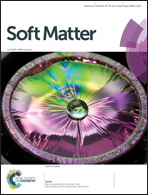Liquid crystal polymers with motile surfaces
Abstract
In analogy with developments in soft robotics it is anticipated that soft robotic functions at surfaces of objects may have a large impact on human life with respect to comfort, health, medical care and energy. In this review, we demonstrate the possibilities and versatilities of liquid crystal networks and elastomers being explored for soft robotics, with an emphasis on motile surface properties, such as topographical dynamics. Typically the surfaces reversibly transfer from a flat state to a pre-designed corrugated state under various stimuli. But also reversible conversion between different corrugated states is feasible. Generally, the driving triggers are heat, light, electricity or contact with pH changing media. Also, the macroscopic effects of those dynamic topographies, such as altering the friction, wettability and/or performing work are illustrated. The review concludes with the existing challenges as well as outlook opportunities.



 Please wait while we load your content...
Please wait while we load your content...